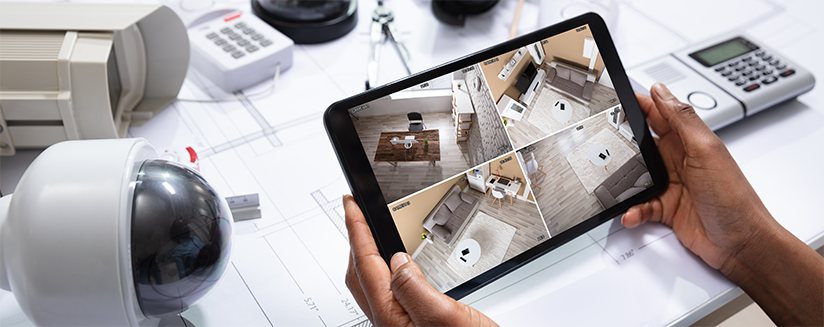The main reasons we as homeowners purchase alarm systems are to protect our homes and more importantly to protect our families. That’s why it is important to weigh your options as you choose an alarm system for your home — not all alarm systems are the same. In this post, we’re laying out some of the top considerations for choosing the best smart home alarm system for your family.
2 Types of Home Security Alarm Systems
In today’s world, there are many tools available that can help us take care of our homes — burglar alarms, fire alarms, smoke detectors, carbon monoxide detectors, video surveillance, environmental sensors, and more. There are plenty of options for all of these alarms but in this post, we’re focusing on security alarms. As you shop for a system for your home you’ll likely run into the following four systems.
- Wireless Home Alarm Systems
- Wired Home Alarm Systems
Wireless Home Alarm Systems
Yes, a wireless home alarm system is one that communicates without wires. Instead of relying on a connection of wires, a wireless system relies on Wi-Fi, Bluetooth, radio frequencies, or cellular signals. These systems may include sensors, cameras, and alarms. When your wireless device picks up unusual activity, it tells other parts of the system that something isn’t right. Most wireless alarm systems are designed to call emergency services on your behalf, usually, this means a 911 call for the police. Buyer beware: Watch out for alarm systems promoted as wireless but that really just means they run on a battery. Make sure to look at the product details or speak to a professional before you make your purchase.
Pros of Wireless Home Alarm Systems
- Easy Installation: Most wireless alarm systems are easy to install and don’t require many tools or electrical skills.
- Portable: Wireless systems are easy to pack up and take with you when it’s time to move.
- Battery Backup: If the power goes out at home, most wireless systems have a backup battery to keep things running.
- Versatile: Wireless home alarm systems may integrate with other smart home technology and can include smoke detectors, flood sensors, and more.
- Easier to Upgrade: Wireless systems are easier to upgrade with new software.
Cons of Wireless Home Alarm Systems
- You Get What You Pay For: Cheap and outdated wireless systems can be hacked.
- Vulnerable to Signal Interference: Depending on the type of system, you’ll need to be careful about where sensors are placed.
- Internet Cost: If your system draws on Wi-Fi, you’ll want a plan that can accommodate all of your devices.
Wired Home Alarm Systems
Wired, or hardwired, alarm systems typically require the use of wires to connect sensors to the system’s control panel. Wired systems also refer to the use of wires or cables to connect to a monitoring system and may also refer to how the alarm system gets its power. Fully wired alarm systems can be found in older homes and buildings as well as larger buildings. Most of the newest alarm systems are wireless.
Pros of Wired Home Alarm Systems
- There may be no Signal Interference: Hardwired systems are more reliable than wireless systems, these are best for larger properties.
- No Battery Maintenance: No need to worry about changing out the battery or checking the charge on this type of system because it is plugged into power.
- May Cost Less: Generally hardwired systems may cost less and require fewer parts than wireless systems.
Cons of Wired Home Alarm Systems
- Challenging to Install: Installing a hardwired alarm system can be messy and time-consuming, it’s best to hire a pro for this installation.
- Susceptible to Power Outages: No batteries but if your power goes out you’re out of luck, fortunately, any previously recorded footage will be stored.
- Not Portable: Unlike wireless systems, wired system installation involves running wires behind drywall and screwing parts into place making them much less portable.
What is a Smart Home Alarm System?
A wireless alarm system is typically considered a smart home alarm system. Smart home technology is tech that works with your home’s Wi-Fi network and helps with home automation. Home automation systems give you greater access and control over the technology in your home. Some smart home features include control over your lights, running water, locks, doorbell cameras, remote (distant) garage door opening, and others. Home security alarms and other alarm systems that can be monitored and controlled from an app on your phone are considered smart home alarms.
Benefits of a Home Automated Alarm System
What are the benefits of a home automated alarm system? Primarily convenience and peace of mind. Smart home alarms, or automated alarm systems, can be programmed and controlled from your home. Set your alarm to activate at a certain time and if necessary deactivate it manually by phone. As an added bonus, some insurance companies offer discounts to homeowners with automated alarm systems.
Find Out Which Alarm System Is Right For Your Home
Talk to our professional team today to learn about the different security solutions we have available in Connecticut and New York areas. You’ll have many options and you can customize them to suit your needs. For monitored security solutions, you’ll want to compare your options. When you’re ready to add smart features to your home, our team at Lifetronic Systems is ready to help you.





